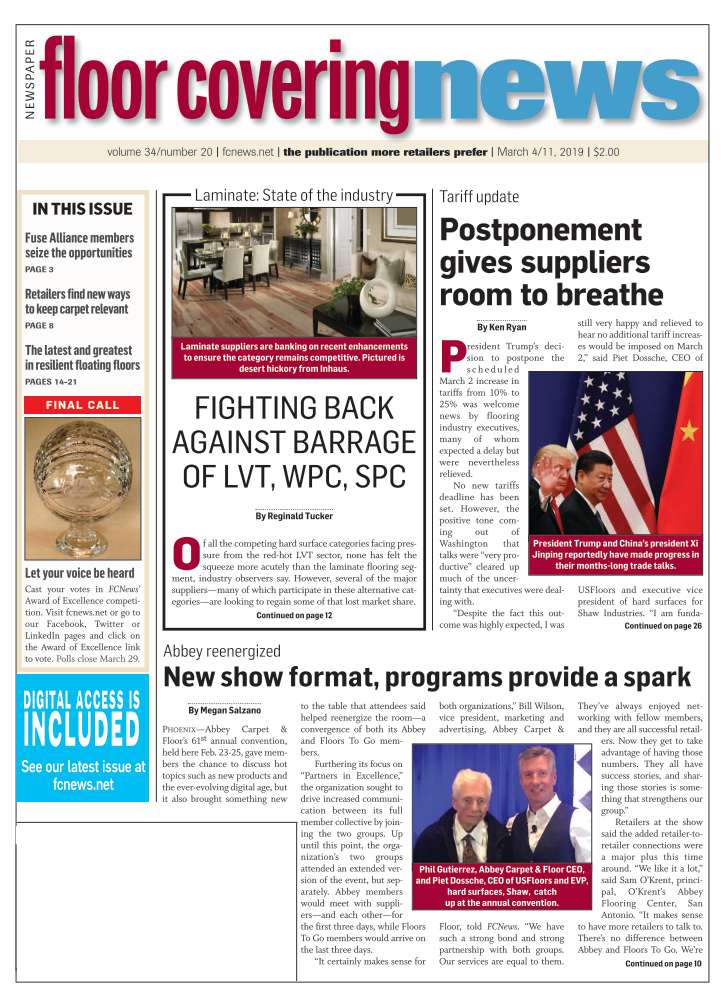March 4/11, 2019: Volume 34, Issue 20
By Jim Augustus Armstrong
 When I first meet my clients, it’s not uncommon for them to tell me they’ve been putting in 50-70 hours per week. I’ve even encountered a few tortured souls whose average weekly hours on the job were north of 90.
When I first meet my clients, it’s not uncommon for them to tell me they’ve been putting in 50-70 hours per week. I’ve even encountered a few tortured souls whose average weekly hours on the job were north of 90.
As a flooring dealer you work very hard. You provide employment. You help people make their homes beautiful and inviting. You also shoulder the risk that goes with being an entrepreneur. You deserve to have an awesome life in flooring—to make a lot of money and have a business that’s rewarding.
However, if you want to have a great life in flooring, you must transition your business from being owner-dependent to system-dependent.
While I was at TISE earlier this year, I interviewed the leaders of two major flooring software companies—QFloors and RFMS—about technology’s role in helping dealers transition to being system-dependent.
“There’s a lot of confusion about the types of flooring-specific software,” said Chad Ogden, president, QFloors. “It’s important for dealers to understand there are four basic categories: estimation, room virtualization, CRM and ERP.”
Estimation software enables you to create job quotes quickly and efficiently, even right in the customer’s home (see page 24 in this issue). Room virtualization allows customers to see what different flooring types will look like in their home. Customer Relationship Management (CRM) tracks the customer as they move through your sales and marketing funnel. Some CRMs also provide email and other marketing capabilities.
ERP, another popular acronym, stands for Enterprise Resource Planning. “It’s the software that does the heavy lifting of helping to systemize the daily operations of your business, such as calendaring, inventory, accounting, etc.,” Ogden said.
Knowing your numbers is also important if you want to grow your business efficiently. After all, that which gets measured gets improved. “It’s vital that your software be able to give you key performance indicators any time you need them,” said Fred Kotynski, chief information officer for RFMS. “For example, if your goal for the current year is to have overall margins of 40% or more, you need to be able to check regularly that you’re hitting that benchmark, break it down by salesperson and do it with a single click. Quickbooks and other generic accounting software can’t do that efficiently.”
It’s critical you take the time to educate yourself on the different software systems available. “Dealers shouldn’t necessarily rush into a buying decision when looking at software,” said Miranda Golden, administrative director, RFMS. “My advice is to explore the software and take the time to really understand what you’re buying.”
Finally, realize that software by itself will not make your business system-dependent. Software is not the system; software makes the system you already have in place—or the one you want to put in place—run more efficiently. For example, every flooring company needs a calendaring system. As part of that system you need to have a written procedure for scheduling appointments, communicating appointments to your staff, etc. This is true whether your calendar is done on paper or as part of your flooring software. The only difference is the software makes your system run more efficiently.
Jim Armstrong is the founder and president of Flooring Success Systems, a company that provides digital and offline marketing services as well as coaching to help flooring dealers make more money, work fewer hours and get their lives back. Visit flooringsuccesssystems.com for more information.

